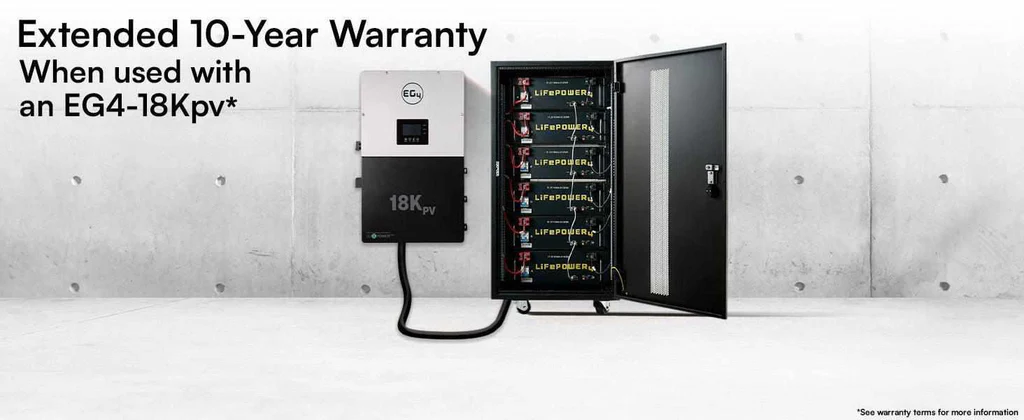Understanding the EG4 Battery System for Residential Use
The demand for reliable and safe energy storage solutions in residential settings has never been higher. Among the various options available, eg4 use in residential dwelling units 9540 stand out for their high performance, efficiency, and safety. These batteries, specifically designed for residential dwelling units, offer a unique combination of advanced technology and rigorous safety standards, making them an ideal choice for homeowners seeking dependable energy solutions.
What Makes eg4 Use In Residential Dwelling units 9540 Batteries Ideal for Residential Use?
EG4 batteries are engineered with residential applications in mind, ensuring they meet the unique demands of home energy storage. They are compact, easy to install, and integrate seamlessly with existing home energy systems. But what truly sets them apart is their UL 9540A certification, which guarantees that these batteries have undergone stringent safety tests to prevent potential hazards such as thermal runaway, gas emissions, and other risks commonly associated with battery storage systems.
The Importance of UL 9540A Certification
UL 9540A is a critical safety standard for energy storage systems, especially those used in residential settings. This certification involves comprehensive testing to evaluate a battery’s ability to withstand and prevent thermal events, which are one of the most significant risks in energy storage systems. For homeowners, this means that EG4 batteries not only provide reliable energy storage but also ensure a high level of safety, reducing the risk of fire, gas leaks, and other hazards.
The Role of eg4 Use In Residential Dwelling units 9540 Batteries in Modern Residential Energy Solutions
As residential energy needs evolve, so does the technology that powers homes. EG4 batteries are at the forefront of this evolution, offering advanced features that make them more than just a backup power source. These batteries play a vital role in enabling energy independence, supporting renewable energy sources, and enhancing the overall efficiency of home energy systems.
Supporting Renewable Energy Integration
One of the primary uses of EG4 batteries in residential dwelling units is to store energy generated from renewable sources such as solar panels. By storing excess energy during the day, homeowners can use it during the night or in case of a power outage, maximizing the use of renewable energy and reducing dependence on the grid. This not only cuts energy costs but also supports environmental sustainability.
Maximizing Solar Energy Efficiency
For homes equipped with solar panels, EG4 batteries are essential in optimizing energy use. They ensure that no solar energy goes to waste by storing surplus electricity that can be used when the sun isn’t shining. This makes homes more self-sufficient and reduces electricity bills significantly.
Energy Independence and Resilience
In areas prone to power outages or where the electrical grid is unreliable, having a reliable battery storage system is crucial. EG4 batteries provide homeowners with the peace of mind that comes with knowing they have a dependable backup power source. Whether it’s during a storm, a blackout, or any other emergency, these batteries ensure that essential home systems continue to operate without interruption.
Enhancing Grid Reliability
In addition to providing backup power, EG4 batteries help stabilize the grid by reducing peak demand. During times of high electricity use, homeowners can draw power from their batteries instead of the grid, alleviating stress on the grid and contributing to overall energy reliability.
Key Features of eg4 Use In Residential Dwelling units 9540 EG4 Batteries for Residential Use
When choosing a battery for home energy storage, several factors must be considered, including safety, capacity, efficiency, and lifespan. EG4 batteries excel in all these areas, making them a top choice for residential applications.
Safety and Reliability
Safety is a top priority for homeowners, and EG4 batteries are designed with this in mind. Their UL 9540A certification is a testament to their safety, having passed rigorous tests to ensure they do not pose a risk of thermal runaway or gas emissions. This makes them one of the safest options available for home energy storage.
Thermal Management
EG4 batteries feature advanced thermal management systems that prevent overheating and ensure stable operation under various conditions. This is particularly important in residential settings where the battery may be located in a confined space or near living areas.
High Capacity and Scalability
Another key advantage of EG4 batteries is their high storage capacity, which can be easily scaled to meet the energy needs of any household. Whether you’re looking to power a small home or a large estate, these batteries can be configured to provide the right amount of energy storage, ensuring that your home is always powered, regardless of its size.
Modular Design
The modular design of EG4 batteries allows for easy expansion. Homeowners can start with a smaller system and add more batteries as their energy needs grow, making it a flexible solution for any home.
Efficiency and Longevity
Efficiency is another critical factor when it comes to battery storage. EG4 batteries are designed to provide high efficiency, ensuring that the maximum amount of stored energy is available for use. Moreover, these batteries have a long lifespan, offering years of reliable service without the need for frequent replacements.
Low Maintenance Requirements
One of the advantages of EG4 batteries is their low maintenance requirements. These batteries are designed to operate smoothly with minimal upkeep, making them a hassle-free solution for homeowners who want a reliable energy storage system without the need for constant monitoring and maintenance.
Installation and Integration of EG4 Batteries in Residential Units
Installing EG4 batteries in a residential dwelling is a straightforward process, thanks to their user-friendly design and compatibility with a wide range of energy systems. However, there are some important considerations to keep in mind to ensure optimal performance and safety.
Preparing for Installation
Before installing an EG4 battery system, it’s essential to assess your home’s energy needs and determine the best location for the batteries. Ideally, they should be placed in a cool, dry area with adequate ventilation to prevent overheating and ensure long-term performance.
Site Assessment
A professional site assessment can help identify the best location for your EG4 batteries and ensure that your home is ready for installation. This assessment typically includes an evaluation of your home’s electrical system, energy usage patterns, and potential installation sites.
Connecting to the Home Energy System
Once the site has been prepared, the EG4 batteries can be connected to your home’s energy system. This process involves wiring the batteries to your home’s electrical panel and integrating them with any renewable energy sources, such as solar panels, to ensure seamless operation.
Inverter Compatibility
It’s important to ensure that your EG4 batteries are compatible with your home’s inverter. The inverter is responsible for converting the stored energy from the batteries into usable electricity, so compatibility is crucial for efficient energy use.
Post-Installation Considerations
After the installation is complete, there are a few post-installation considerations to keep in mind. These include regular system checks, monitoring battery performance, and ensuring that your system is properly maintained to extend its lifespan and maximize efficiency.
Monitoring and Maintenance
Most EG4 battery systems come with monitoring software that allows homeowners to track their energy usage and battery performance in real-time. Regular monitoring can help identify any potential issues early and ensure that your system continues to operate at peak efficiency.
Cost and ROI of EG4 Batteries in Residential Units
Investing in EG4 batteries for your home is a significant decision, and it’s important to consider the cost and potential return on investment (ROI). While the upfront cost of installing these batteries can be substantial, the long-term savings and benefits often outweigh the initial investment.
Initial Investment
The cost of EG4 batteries varies depending on the size of the system and the specific needs of your home. However, even a modest-sized system can represent a significant investment. It’s important to factor in the cost of the batteries themselves, as well as installation and any necessary upgrades to your home’s electrical system.
Financing Options
Many homeowners choose to finance their EG4 battery systems through loans, rebates, or incentives. Some states and municipalities offer incentives for installing energy storage systems, which can help offset the initial cost.
Long-Term Savings
While the initial cost of EG4 batteries can be high, the long-term savings can be substantial. By storing and using your own energy, you can significantly reduce or even eliminate your electricity bills. Additionally, if your system is connected to the grid, you may be able to sell excess energy back to your utility company, further increasing your ROI.
Energy Bill Reduction
One of the most immediate benefits of installing EG4 batteries is the reduction in your energy bills. By using stored energy during peak hours, when electricity rates are highest, you can save money and reduce your dependence on the grid.
Resale Value and Home Equity
Investing in EG4 batteries can also increase the resale value of your home. Energy-efficient homes with advanced energy storage systems are often more attractive to buyers, which can lead to a higher selling price and a faster sale.
Energy Independence as a Selling Point
In a real estate market increasingly focused on sustainability and energy efficiency, having EG4 batteries installed in your home can be a significant selling point. Buyers are often willing to pay a premium for homes that offer energy independence and reduced utility costs.
Conclusion
eg4 Use In Residential Dwelling units 9540 represent a cutting-edge solution for residential energy storage, combining safety, efficiency, and reliability. With UL 9540A certification, these batteries provide homeowners with a safe and effective way to store energy, reduce electricity bills, and support renewable energy integration. Whether you’re looking to enhance your home’s energy independence or simply need a reliable backup power source, EG4 batteries are an excellent choice for any residential dwelling unit.
Also Read: Totally Rad NYT: Revisiting the 1980s
FAQs
What are the key benefits of using EG4 batteries in residential dwellings?
EG4 batteries provide reliable energy storage, support renewable energy integration, enhance grid stability, and offer safety features like UL 9540A certification to prevent thermal and gas hazards.
How does the UL 9540A certification enhance the safety of EG4 batteries?
The UL 9540A certification ensures that EG4 batteries have undergone rigorous testing to prevent thermal runaway, gas emissions, and other potential hazards, making them safe for residential use.
Can EG4 batteries be used in homes without solar panels?
Yes, EG4 batteries can be used in homes without solar panels as a backup power source or to store energy from the grid for use during peak hours or outages.
What factors should I consider when installing EG4 batteries in my home?
Consider your home’s energy needs, the best location for installation, inverter compatibility, and the potential for expanding the system as your energy requirements grow.
How long do EG4 batteries last?
EG4 batteries are designed for longevity, with many models offering a lifespan of 10-15 years, depending on usage and maintenance.
Is it worth the investment to install EG4 batteries in my home?
While the initial investment can be significant, the long-term savings on energy bills, potential increases in home value, and the peace of mind from having a reliable backup power source make it a worthwhile investment for many homeowners.



